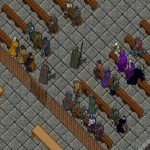Reminiscing about Ultima Online in the comment-field in a different post made me all nostalgic, like. And I came to realize that no MMORPG (or MMO, if you prefer) I have played since has struck a chord with me to the same extent as it did. Not just because it was my first MMORPG – I recognize that very little compares favorably to one’s “first”, but also because UO awoke in me a desire for virtual worlds. Take note that I used the word “worlds” there and not “games”. I like games. I’ve played games all my life, and will continue to do so for as long as I am able to. Virtual worlds, however – that’s the stuff dreams are made of! Also, the Matrix.
Let’s take it from the beginning

On the 31st of December 1997 I started playing Ultima Online. It sounded like a dream come true at the time; to be able to run around in the Ultima-universe alongside other real people living out our alternative lives, dispatching hordes of monsters, living the stories, even baking bread? Hallelujah!
A cousin of mine got the game as a Christmas gift, after I had been drooling over the game for months and he had barely heard of it! O, what cruel fate! Luckily for me, though, his computer did not meet the minimum required system specifications (Pentium 133MHz, 16MB RAM, 4X CD-ROM Drive!) to run the game, so the game ended up being installed on my beast of a P200 MMX instead *rubs hands gleefully together sometime in the distant past*
A couple of months later I got my own copy of the game and from then on there was no looking back (until now).
Continue reading “Reminiscences of an MMORPG burnout victim”